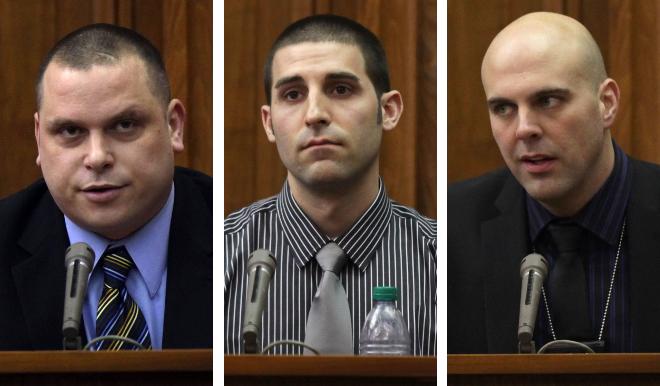[the original 'I can't breathe'] Family Files Lawsuit vs Milwaukee: White Cops Crushed Unarmed Black Man then Watched Him Suffocate to Death in Cop Car [coffin]
"I Can't Breathe Sir." In 2011 Williams suffocated to death while handcuffed, naked from a strip search, in the back of a police car. He repeatedly told white Milwaukee police officers he couldn't breathe for at least 15 minutes between the time of his arrest and his death. They repeatedly ignored him as he suffocated to death.
From [HERE] The family of Derek Williams, Jr., who suffocated at age 22 in the back of a Milwaukee squad car, denounced the white officers who ignored their relative's cries for help in a federal lawsuit filed five years after the young Black man's death.

Just after midnight on July 6, 2011, white Milwaukee police overseers arrested Williams as a suspect in a robbery. Williams had run from police before being apprehended in the backyard of a house at 2752 N. Buffum St.
Footage from the back of the squad car showed Williams repeatedly told the officers, "I can't breathe," but police ignored his requests for medical help until he was already unresponsive 15 minutes later, his family says in a lawsuit filed Wednesday in Eastern Wisconsin Federal Court.
Milwaukee's medical examiner initially insisted Williams died of natural causes until a local newspaper, The Milwaukee Journal Sentinel, presented the office with new evidence a year later, including the squad-car video and other records.
With Williams' death then ruled a homicide, a coroner's inquest jury found that three of the officers — Richard Ticcioni, Jason Bleichwehl and Jeffrey Cline — could be criminally charged with failing to provide aide, but a special prosecutor declined to prosecute the men in early 2013.
The case continued to haunt Milwaukee in recent years as protests against police brutality rocked the nation through the Black Lives Matter movement, which adopted "I can't breathe" as a slogan from the death cry of another black man -- New Yorker Eric Garner -- in policy custody.
Five years to the day after Williams' death, his three young children — all between the ages of 5 and 7 — and their mother Sharday Rose filed a civil-rights lawsuit against Milwaukee and 11 of its police officers.
The family says that Williams' "agonizing death" began when Patrick Coe and Ticcione threw him to the ground, beat him, and knelt into his back as they handcuffed him.
"As Mr. Williams was lying on his back, he again stated that he could not breathe," their 22-page complaint states.
All 11 officers named in the complaint heard and ignored Williams' complaints, according to the lawsuit.
When Cline asked for his surname, Williams again replied, "I can't breathe," the family says.
"You're breathing just fine," Cline allegedly shot back, accusing Williams of "just playing games."
After rocking back and forth for two minutes begging for help, Williams pleaded for an ambulance, and slumped over his seat motionless a minute later, the family says.
Shortly after, Bleichwehl noticed Williams lying there over his shoulder, moved to the backseat and could not feel a pulse on his suspect's neck, according to the lawsuit.
"Despite defendant Bleichwehl's observations that Mr. Williams was motionless, non-responsive and without a pulse, he did not call for medical assistance," the complaint states.
By the time Officer Chad Boyack requested medical help at 12:59 a.m., it had already been 15 minutes after Williams came into police custody, 12 minutes after he entered the squad car and three minutes after being found motionless, the family says.
Williams was pronounced dead at 1:41 a.m.
His family's lawsuit alleges seven counts against Milwaukee and the officers, including excessive force, failure to provide medical attention, wrongful death and allowing a pattern and practice of unconstitutional actions.
They are represented by G. Flint Taylor of the People's Law Office in Chicago, and by Jonathan Safran of Samster, Konkel & Safran in Milwaukee.